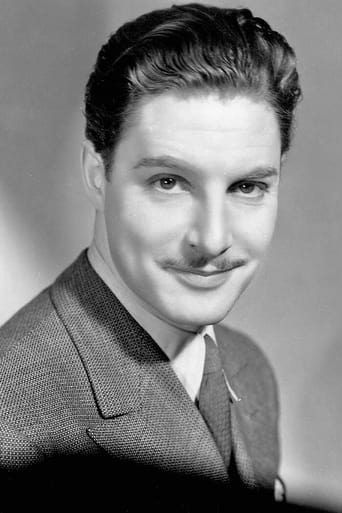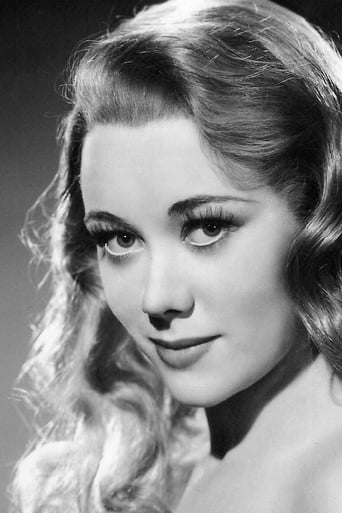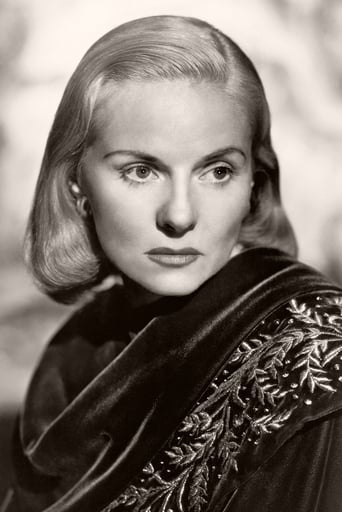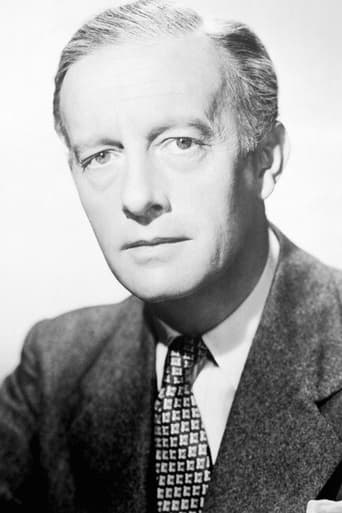Catangro
After playing with our expectations, this turns out to be a very different sort of film.
AshUnow
This is a small, humorous movie in some ways, but it has a huge heart. What a nice experience.
Keeley Coleman
The thing I enjoyed most about the film is the fact that it doesn't shy away from being a super-sized-cliche;
Deanna
There are moments in this movie where the great movie it could've been peek out... They're fleeting, here, but they're worth savoring, and they happen often enough to make it worth your while.
Robert D. Ruplenas
What a wonderful movie! As is often the case I was drawn to it by the names - Robert Donat, Deborah Kerr, Glynis Johns and Alexander Korda. How can you go wrong? I learned later that this was the flick that made Kerr a star, and understandably so. Glynis Johns is always a delight to the eye.The story line - a humdrum couple separated and transformed by the war - sounds like the makings for a pretty humdrum soap opera, but the script is very well done and involves us in the stories of these two people as they drift away from each other (or so they think).The great Alexander Korda's direction is spot on and masterful. Particularly impressive are the cutaway shots from husband to wife as each of them travels home to meet each other on leave after 3 years apart from each other, he in the Navy, she in the Wrens (Britain's naval corps for women). We learn from their conversations with their traveling companions about their apprehensions about reuniting. The scene where they face each other with their doubts is shot completely in the dark, a master stroke, reflecting the fact that they really don't know each other anymore.It's also a very good snapshot of wartime life in Britain.Altogether a wonderful find. Thank you Turner Classic Movies.
mark.waltz
Boring as an evening with "Family Guy's" Buzz Killington, the predictable marriage of Robert Donat and Deborah Kerr has gotten so staid that they seem too uninterested in the other party to hate them. They do what they need to do. She gets up, prepares his breakfast, he gets ready to go to work, and they are barely able to pucker up to kiss each other goodbye. But this is the beginning of World War II, and Donat must go off to combat. Kerr too gets involved, and as a result, they don't see each other for four years. A lot can happen in four years, and in the case of Kerr, she spruces up her hair, puts on some makeup, and begins to hang out with the gregarious Glynis Johns. He shaves off that horrid mustache, takes off a few pounds thanks to some military exercise, and learns to flirt. Now he is coming home and each of them decides it is time to move on. They meet in the dark, discuss their wish for a divorce, and walk into a restaurant where with the lights on, they see each other really for the first time.I believe this appears to be a rather realistic storyline because in World War II, many women found themselves making a living, becoming independent, and when the men returned, they were shocked by what they found. The men too went through changes as war, even as horrific as previous ones had been, was entering a modern era, and the enemy was more ruthless and determined than ever. The problem isn't one easily to blame on a mediocre film. Because the original views of this couple is meant to be boring, the actors give boring performances. That is part of what they were called to do. Then, war happens, the two change, and presto, chango, Kerr and Donat are as we know them from more glamorous roles. I do not find the film boring in the sense of sleep inducing, but unless you are really prepared for a dull vision of what this marriage is, you might find yourself yawning in spots. The second half of course livens up, sort of a mutual "My Fair Lady" where the guttersnipe and the chimney sweep somehow got ahold of their own fairy godmother and changed into what they had the potential of being before but had been unaware of. So the acting of the film is not really outstanding, although Johns gives a truly showy performance, but the point is really about story, not acting. Technically, the film (a British MGM production) is superb as many British films seemed farther advanced in that area than American films. (Check out the original version of "Gaslight", as well as "A Canterbury Tale", "Stairway to Heaven" and especially "Black Narcissus" to see what I mean).In retrospect, this film is probably what the sequel to "Mrs. Miniver" really should have endeavored to be, not the confusing mess that became "The Miniver Story" years after people really cared what happened to those characters.
Robert J. Maxwell
The English title, "Perfect Strangers," was changed to "Vacation From Marriage" for its USA distribution. It's amazing that it ever was finished. Aside from a good deal of trouble concerning the script, it was filmed in 1944 when there was a shortage of sets and equipment and everything else in England except myriad Buzz Bombs.The story had been done before. Two stodgy spouses undergo some sort of traumatic experience and find their marriage improved as a result. Here, the spouses are the stuffy and boring Robert Donat ("The Thirty Nine Steps") and the whimpering hypochondriacal Deborah Kerr. The traumatic event is a three-year separation for war service -- he in the Navy and she a Wren.During the separation they change by force of circumstances. Donat shaves his mustache and has a fling with a blond. Kerr, under the guidance of the fey Glynis Johns, has her hair redone and acquires self confidence. When they are brought back to England to spend their leave together, each liberated spouse still carries the image of the stultifying other. They didn't even kiss good-bye at their departure. Kerr, afraid to enter their apartment, calls him hysterically and demands a divorce. They meet at a nearby pub, The Coach and Horses, and each is surprised but wary at the change in the other. They flirt, quarrel, part, and make up. It ends happily with an embrace in front of the window of their flat, overlooking a blitzed London overhung with barrage balloons, a fresh new morning.It's all very well done. There aren't any belly laughs but a viewer may be forgiven for smiles of recognition at the minor ironies of life that are on full display here.Donat is his smooth self. Kerr is winsome and girlish, slightly wall eyed, her voice slightly quivering, and completely winning, so innocent in appearance and demeanor that it would be obscene to think of her legs. I couldn't help it so I did it anyway.You'll probably enjoy this. The script isn't high flown. This isn't Shakespeare; it's everyday life. But all the characters are precise and somewhat elegant in their speech. The Brits always sound a little more elegant than the rest of us.
samhill5215
This outstanding gem had me hooked from beginning to end. Although the subject matter, a relationship between husband and wife that derails after a three year separation, is common enough the strong performances of the main characters kept me interested in their lives, their growth, and ultimately the outcome of their reunion. Robert Donat has never been one of my favorite actors but here he shines as the husband who, having grown as an individual during the war is utterly bewildered by his wife when he meets her on his leave. As for Deborah Kerr, she is utterly enthralling. She is capable of convincingly portraying both a plain Jane as she does here and in "Separate Tables" and a glamorous heart-stopper as in the pub scene, when Donat sees her for the first time after their three year separation. In fact, I would say that I liked her performance here better than in "From Here to Eternity" for which she was also nominated for an Oscar. I also can't say enough about the camera work. There are numerous scenes worthy of portraits. One in particular stands out, at the very end, where Kerr is sitting at her picture window looking out over bombed out London. It's enough to take your breath away.I only have two criticisms: Kerr's character doesn't need to powder her nose repeatedly. One time is enough to make it clear that she has left her unglamorous self behind. More than once seems vain. But then again perhaps the director intended that. I also have a problem with the final scene. I think it's rushed, almost as if the director ran out of time. After the rancor and vitriol that Kerr and Donat hurled at each other it seems unlikely they would have embraced so passionately so soon. To get to that point they needed more dialog to resolve their differences. In its absence I would have preferred it if they had just held hands leaving their ultimate destiny more ambiguous and thus more realistic.





